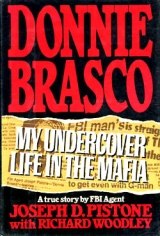
Текст книги "Donnie Brasco: My Undercover Life in the Mafia"
Автор книги: Joseph D. Pistone
сообщить о нарушении
Текущая страница: 28 (всего у книги 28 страниц)
UPDATE
July 1988
by Joseph D. Pistone
Since my book came out in hardcover, Peggy and I have been interviewed by Time, People, 20/20, and Good Morning America. I appeared on shows hosted by Larry King, Geraldo Rivera, and others.
More than anything else, those journalists, studio audiences, and people who phoned in, wanted to know more about how my investigation affected the Mafia, how those years undercover affected the Pistone family, and whether I would do it all again.
As a result of my investigation, the Mafia has changed some of its rules for membership. The mob has since reinstituted an old rule, that a proposed member must “make his bones” or kill someone, before he can become a made guy. They have done so because no agent would commit murder while posing as a bad guy.
Plus, two Mafiosi have to vouch for a proposed member. So now two wiseguys have to take the responsibility instead of just one. They have to say they have known the proposed member if not since childhood, then at least for fifteen to twenty years.
Meanwhile, increased pressure from enforcement, particularly from the FBI, has led many top-echelon mob members to become informants, more than at any other time in the history of the Mafia.
Of course, those defections and the more than 100 federal convictions we obtained have caused a leadership problem for the Mafia. With so many top guys out of action, there is a prevailing sense of mistrust and wariness in each family and in relations across family lines. I’m happy to say that the leadership problem is here to stay.
The Mafia’s values are shifting. I helped speed up that process.
The oldtimers—who brought the values of the old country with them, who believed that whatever you did, you did it for the crew and, all the way up the line, ultimately for the organization—are dying off or are stuck in jail.
There, they are lamenting the fact that La Cosa Nostra—“Our Thing”—is becoming “My Thing” in the hands of the younger generation.
The new Mafia is made up mostly of guys born in this country, who are into easy living. They do not possess the same strong attachment to kinship and “family” honor that the old wiseguys did. This Ameri canization of the Mafia—coupled with law enforcement’s concerted onslaught of indictments and investigations—is eroding the mob’s power.
But there is another thing that is weakening the Mafia: as in the larger society, the Mafia subculture is facing the problem of drug abuse.
The Mafia has trafficked in narcotics for decades. It’s true that only certain people in certain families get involved in large-scale importation and distribution, but everyone tries to traffic because of the profits to be made. However, very few of the older guys were users.
Now, despite the longstanding, unwritten Mafia rule against using drugs, many of the younger members are addicted to drugs, particularly to cocaine.
Picture this: if you use cocaine, chances are you will never see more than a gram or two at any one time in your life; if you do become addicted, chances are you’ll become a crook to support your habit, although probably not a very good one. Now imagine being an importer and distributor. You take control over kilos of the stuff. And you already make your livelihood as a crook. Chances are, as a Mafia coke addict, you’ll eventuallly try to screw somebody in a deal and get whacked. If you live long enough, you’ll make yourself crazy.
That’s how it is. Members of the “Me Generation” Mafia are like kids in a coke candyshop.
When I appeared on talk shows, it seemed 99 percent of the audience was very pro about what the FBI did, and some people even said I was an American hero. For me, it is hard to think of myself as a hero—it was just a job, and I did it.
People wanted to know whether I felt I was on a mission to clean out the Mafia because I’m an Italian-American.
I didn’t carry out the investigation on behalf of upstanding Italian-Americans. I wasn’t an ethnic policeman. Truly, it didn’t matter to me that it was the Mafia. I would have accepted any undercover assignment against any group the FBI targeted.
I am proud about how it turned out, however.
Italian-Americans have told me they are proud that I had the courage to do it and that I showed the nation that not all Italians side with the Mafia.
Some people even said they never realized the Mafia was not invincible. A lot of people thought the Mafia was an organization law enforcement couldn’t do anything with. They were glad that our government got involved. It makes people feel good to know the myth of the Mafia has been broken.
Now we know the Mafia is not invincible.
It’s also clear that the Mafia preys on Italians as well as other people.
At the very least, I think I helped destroy some fantasies. Unlike the images we got in movies like The Godfather, the Mafia in real life is repetitious. Conversations are mind-numbing. “What are we gonna steal today? How are we gonna steal it?”
On the other hand, some people asked, “How could you have done it to other Italians?”
I don’t feel that way. I busted a group of people involved in illegal activities.
Not viewing the probe from an ethnic point of view was important for keeping a proper perspective. Another reason the investigation was successful was that I knew, no matter what I did, that I was not going to reform anybody in or around the Mafia, that the people I was getting close to were going to lie, steal, cheat, and murder whether I was there or not. My goal was to gather evidence for later prosecutions. I was not a social worker.
Some people also questioned the FBI’s decision to give money to Lefty during the operation. Lefty was given about $40,000 by undercover agents Conti and Rossi because they were supposed to be “marks.” They were paying him for his services as a “wiseguy” to insure they had the protection of the Bonanno family in the event another family tried to interfere with their business.
It was a good investment for a number of reasons. By giving him money, Conti and Rossi led Lefty to believe they were willing to become involved with him, and he trusted them as bad guys.
It helped the Bureau obtain valuable intelligence on all the mob families; we even became “partners” with three families in New York, Milwaukee, and Tampa. That information became evidence in court.
By giving Lefty money now and then, we saved many hours, perhaps years, of normal investigative work—work that wouldn’t have necessarily led to evidence for indictments,
Six years in the Mafia didn’t change my values, and if you ask my family, that’s one reason the investigation was an unqualified success.
The time undercover barely changed me on the surface, either. I haven’t had any problem dropping any of the habits or mannerisms I adopted during the course of the investigation.
I have retained some of the wiseguy attitude, however.
Wiseguys don’t make reservations. They just waltz into a restaurant and give a name. Invariably, the maître d’ says, “I’m sorry, we don’t have a reservation in that name.” And the wiseguy says, menacingly, “Whaddya mean, you don’t have one?” And he gets a table right away.
I’ve done that a couple of time as a “citizen.” Out of the corner of my eye I’ll see Peggy shaking her head ... but it works.
Most people back down from a confrontation in public, but in the wiseguy world, you don’t back down. Not from waiters or salesmen or anybody. Instead of saying “forget about it” to yourself, you take the offensive right away. It’s not bullying, at least in a physical sense.
But my brother will see me act this way, and he’ll say, “Joe, you’re not out with the wiseguys.” My answer is,“Why should you be intimidated by somebody when you know you’re right?”
Of all the mobsters I worked against, I’ve been asked the most questions about Lefty Guns Ruggiero.
Do I expect Lefty to try to kill me when he gets out of prison? He’s eligible for parole in 1992.
I expect it. I also know the Mafia will try to kill him, since he took me in as an associate.
Here’s a guy who is definitely of the old school. Lefty knows what he did was wrong, he knows a Mafia contract was put out on him, yet he has not turned stoolie. He has more resilience than most of the younger guys. Honor is so ingrained in him that it’s more important than the strong possibility that he might get killed by his own peers. Lefty had steadfastly refused to cooperate with the government and join the federal witness protection program to reduce his sentence.
It’s ironic, of course, that the Bureau arrested Lefty in the first place to protect him, and that they have continued that protection during his trials and imprisonment, yet he has sworn to kill me—and that I am not eligible for federal protection. But that’s the way it is. I have to depend on myself.
If Lefty survives long enough after his release to come after me ... I can’t worry about it. Whether he does it out of revenge, or if some other mobster tries to kill me to collect the $500,000 contract on my life, I’ll be prepared. I carry a .38-caliber pistol at all times, and may the best man win.
I’m better than anyone I’ve ever met in or around the Mafia. I’ve got to feel that way. I’m one of the good guys—I didn’t do anything wrong. I just did my job.
I take the normal precautions and live each day and try not to think about that contract.
I said try. I think about it sometimes. But I don’t have nightmares about it.
The Mafia is not the first organization in the world to believe there’s no such thing as bad publicity. Word on the street is that most of the wiseguys read this book when it came out in hardcover. Informants told FBI agents that, with the exception of Lefty, the wiseguys liked it. However, they added that I should not have written it. Their reactions didn’t go any deeper than that; wiseguys are not proficient book reviewers.
While we don’t know any more about their feelings about the book, those bare-bones comments tell a lot about the Mafia society. The remarks remind me of something Lefty said when he took it upon himself to educate me in the ways of being a wiseguy: what was so great about being a wiseguy, Lefty said, was that you can lie, steal, cheat, kill and it’s all legitimate.
The people I met in the mob all regarded themselves as legitimate. Wiseguys do not think of themselves as being criminals or gangsters. They come from a subculture where crime is acceptable, normal, even “honorable.” So the wiseguys are apparently happy that I portrayed them true-to-life.
The second reaction, that I shouldn’t have written the story, may be a sign that they still think of “Donnie Brasco” as having been “one of them” and that, in their minds, I betrayed them. That would figure. Mob guys believe cooperating with the government is morally reprehensible, that it is “criminal.” When a wiseguy turns from the Mafia value system, he disgraces himself and his crime family, and the family loses respect in the neighborhood and with business associates.
Lefty’s reaction to my book would be different, of course. It’s a public reminder of the mob contract on his head.
I have been out of the FBI since September 1986, and as of this writing, I am still testifying for the government in cases against the Mafia. I am looking forward to the day when my testimony is no longer needed and I can put the past to rest and get on with the future.
I plan to write another book and to produce a movie about my career. Maybe I could hit the bestseller list again, or even win an Academy Award, but no one in my family will ever brag about it.
I’m referring not only to my immediate family, but also to my parents and my brother and sister, to Peggy’s parents and brother and sister, and to other relatives.
My years undercover altered my relationships will all of them. I could never tell them what I was doing.
They knew I was undercover, but they worried about me because they didn’t know when or if I was being secretive because I had to be, or if because somehow my personality was changing. That has happened to some undercover agents. I could never put their minds at ease during those years.
During the Mafia Commission and Pizza Connection trials, life got worse for our families instead of better. When I became a witness and my name and identity became public, I was guarded twenty-four hours a day. Peggy and the girls were safe, living far away under a different name. But the members of my family, and Peggy‘s, were frightened. My father-in-law was scared to start his car in the morning. No one would mention my name on the phone, fearing the lines might be bugged. Before long, it seemed danger existed everywhere. A few years ago, my sister-in-law and her husband owned a restaurant in New York. As it turned out, a man who ate there had ties with the mob. After my story broke in the newspapers, he told one of the Mafia chiefs he knew a way to get to me.
As for Peggy, the girls, and myself, my whole experience with the Mafia has changed our lives forever.
My oldest daughter still has not read this book. She says she does not want to relive the memories of my years undercover.
Today, Peggy, the girls, and I use different names when we travel, sometimes taking roundabout routes and separate flights.
When we meet people we have to invent stories about our past. We can’t even say I was an FBI agent, something Peggy and I are proud of.
But those six years . . . Peggy says if it were to happen again, she would find a way out, that six years without a husband is too much.
I don’t dispute it.
Including the six years during which I gave testimony as a key witness in the major trials, my family has now been involved with the Mafia for more than twelve years.
In fact, I have spent as much time with the lawyers representing the government’s case as I spent with the mobsters.
As of this writing, we’ve moved six times in those twelve years, and the future holds more of the same.
Would I do it again? As I’ve said before, professionally, I would. Personally ...
Put it this way. If Lefty and I meet again, I know we’re not going to talk. And I know he isn’t smart enough to be ironic. But I can imagine one last conversation:
“I’m proud of what I did, Lefty. If I had to do it all over again, yeah, I would,” I’d tell him. “I exposed the Mafia. We got over a hundred convictions—”
“Yeah,” Lefty would say. “That’s real nice, good for you. You exposed us.
“But if you did so good exposing us, Donnie, whyzit you and your family gotta live a coverup for the rest of your lives?
ACKNOWLEDGMENTS
Special thanks are due the following friends and colleagues:
Richard Woodley who made my story readable.
Michaela Hamilton, my editor, with the fastest blue pencil in the East.
Carmen La Via and Peter Sawyer, my own special agents (literary) from the Fifi Oscard Agency.
Last but certainly not least the man who made it all possible
Mr. Louis Di Giaimo
ABOUT THE AUTHORS
JOSEPH D. PISTONE was an FBI Agent for seventeen years. He now lives under secret identity in an undisclosed location.
RICHARD WOODLEY has written numerous books, including DEALER: PORTRAIT OF A COCAINE MERCHANT and ROOKIE (with Dwight Gooden).









